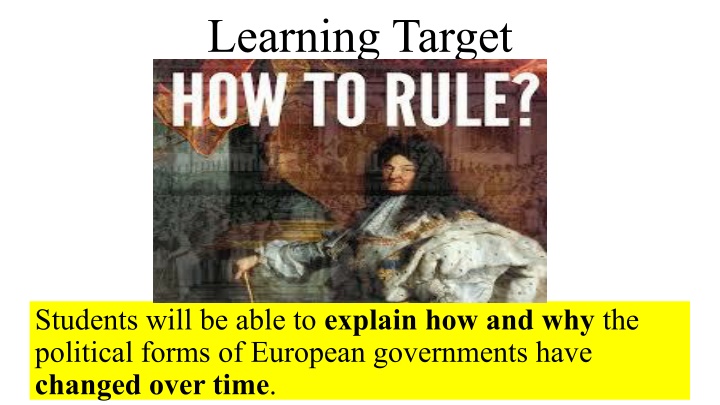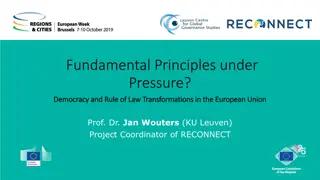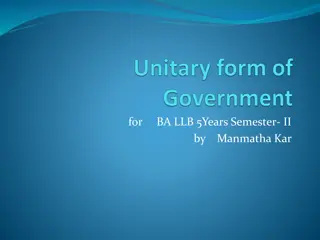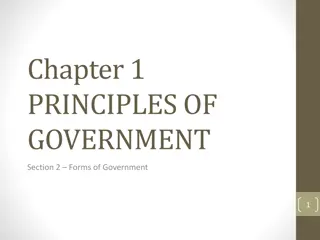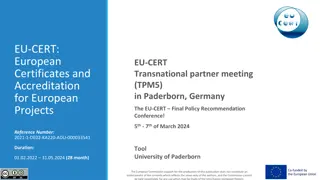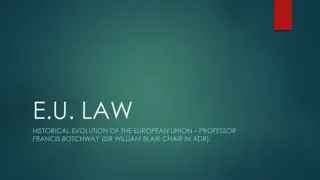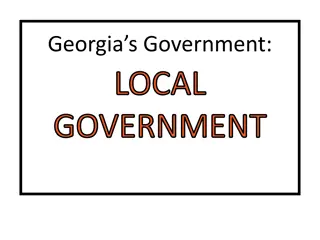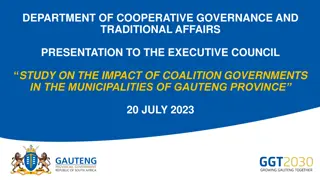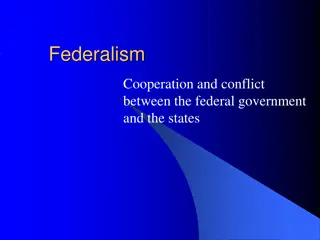Evolution of European Governments: Historical Changes and Challenges
Explore the transformation of European governments through key events like the English Civil War, Glorious Revolution, struggles in Poland between monarchy and nobility, and characteristics of the Dutch Republic during its Golden Age. Uncover the shifts in political forms as monarchies evolved and republics emerged, revealing the complexities of power dynamics and governance structures in European history.
Download Presentation

Please find below an Image/Link to download the presentation.
The content on the website is provided AS IS for your information and personal use only. It may not be sold, licensed, or shared on other websites without obtaining consent from the author.If you encounter any issues during the download, it is possible that the publisher has removed the file from their server.
You are allowed to download the files provided on this website for personal or commercial use, subject to the condition that they are used lawfully. All files are the property of their respective owners.
The content on the website is provided AS IS for your information and personal use only. It may not be sold, licensed, or shared on other websites without obtaining consent from the author.
E N D
Presentation Transcript
Learning Target Students will be able to explain how and why the political forms of European governments have changed over time.
Question #1 List the three central issues of the English Civil War.
Central Issues 1.Taxing authority 2.State Religion 3.Sovereignty
Protestants v. Catholics (Glorious Revolution) Protestants (Church of England) (Calvinists Puritans/Separatists) v. Protestants
Ch. 15 Limited Monarchy and Republics FQ: What were the main issues in the struggle between king and Parliament in seventeenth century England, and how were they resolved?
Question #2 Describe the relationship between the Polish monarchy and nobility.
The Weakness of the Polish Monarchy Struggle between crown and the landed nobility for much of history. Dynastic union of Jagiello = grand prince of Lithuania + Polish queen Jadwiga. 1572 Jagiello dynasty comes to an end after playing big role in 15th and 16thcentury Europe.
Polish monarchy contd Elected outsiders as kings, such as Swede Sigismung III (1587-1631) to form alliances. By the end of the 17thcentury, Poland had become a weak, decentralized state. Monarchs shared power with the Sejm (Polish two-chamber assembly of landowners in matters such as taxation, foreign and military policy and appointment of judges and officials.
Question #3 List three characteristics of the Dutch Republic.
The Golden Age of the Dutch Republic United provinces were an Atlantic power Peace of Westphalia officially recognizes the United Provinces as a new state in 1648. Two major political powers = House of Orange v. States General Orange development of centralized govt. with themselves as hereditary monarchs. William of Orange States General decentralized or republican form of govt.
Life in Seventeenth-century Amsterdam Amsterdam replaces Antwerp as the financial and commercial capital of Europe by 1600. Amsterdam Stock Exchange Calvinist background of wealthy Amsterdam citizens led to simply lifestyle.
Question #4 Who started the Stuart Dynasty after Elizabeth I (Tudor)? What was his relationship like with parliament?
England and the Emergence of Constitutional Monarchy Tudor dynasty ends with Elizabeth in 1603. King James I (formerly King James VI of Scotland) starts the Stuart dynasty. James I alienated members of parliament by claiming divine right to rule and refusing to get rid of the episcopal system of church organization.
Question #5 How did Charles II raise money during his personal rule from 1629- 1640? Describe his relationship with parliament.
Charles I and the Move Toward Revolution 1628 Parliament passes the Petition of Right, which required parliament s permission for any taxation. 1629-1640 Charles I pursued a course of personal rule. Collected ship money to finance his ambitions. Charles I marries Henrietta Maria (Catholic) and parliament fears catholic monarchy. Long Parliament (1640-1660) severely limits royal authority.
Question #6 What s the significance of parliament executing Charles I?
Civil War in England Parliament ended the first phase of Civil War by capturing King Charles I in 1646. Forces of parliament split between Presbyterian majority and radical Independents. Cromwell captures Charles I again and he is beheaded for being a tyrant, traitor, and murderer (1649)
Question #7 What happened after Charles I was executed?
Cromwell and New Governments England was proclaimed to be a republic from 1649-1653. Oliver Cromwell relied on military force to rule England. Faced opposition from Ireland, Scotland and at home with the Levellers. 1655 Cromwell dissolved parliament After Cromwell s death, England decided to restore the Stuart monarchy.
Question #8 Why did the English decide to go back to the Stuart Dynasty with Charles II?
Restoration of the Monarchy Charles II returned to England after 11 years of exile. 1672 Charles II issued the Declaration of Indulgence (suspended laws against Catholics and Puritans) 1673 Parliament passed the Test Act allowing only Anglicans to hold military and civil offices.
Question #9 What was the Glorious Revolution?
A Glorious Revolution James II (brother of Charles II) took the throne as an proud Catholic causing an immediate constitutional crisis. Seven prominent English noblemen invited William of Orange (husband of James daughter, Mary) to invade England. Bill of Rights (1689) parliament s right to make laws, levy taxes, consent for standing armies. Also included the rights of citizens to petition the sovereign, keep arms, have a jury trial and not be subject to excessive bail.
Responses to the Revolution Hobbes v. Locke -Hobbes (1588-1679): Pesimistic view on society, supported a sovereign authority with absolute and unlimited power. (Leviathan 1651) -Locke (1632-1704): believed humans lived in a state of equality and freedom. Inalienable natural rights of life, liberty and property. (Two Treatises of Government)
Key Concept of the Day A.K.A. Major Takeaways Concept 2.1 Different models of political sovereignty affected the relationship among states and between states and individuals. II. Challenges to absolutism resulted in alternative political systems. A. The outcome of the English Civil War and the Glorious Revolution protected the rights of gentry and aristocracy from absolutism through assertions of the rights of Parliament.
